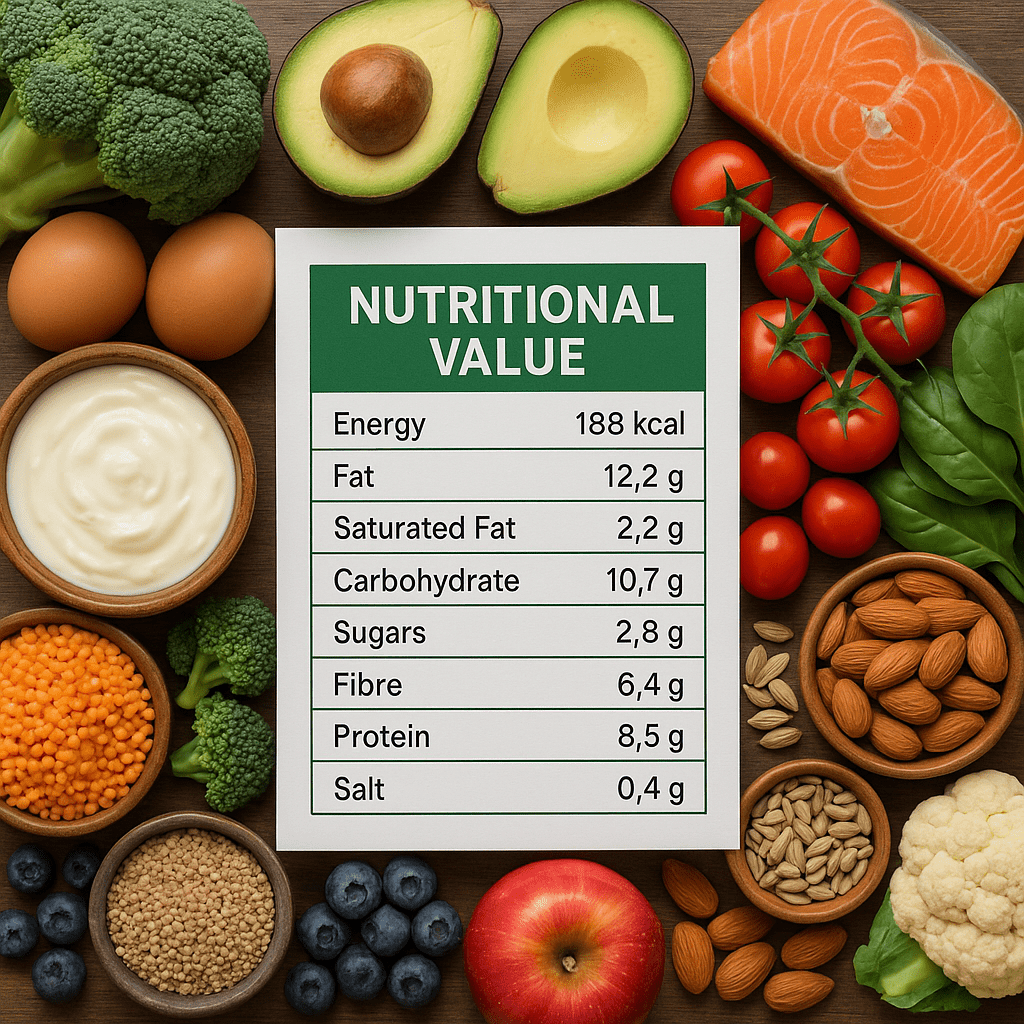The nutritional value of products is an indicator that determines what nutrients and in what quantities are contained in a food product. This indicator is especially important in order to balance our diet, achieve health or physical fitness goals, and prevent various diseases. When choosing food every day, we often do not think about its composition, but it is precisely it that determines whether we will get enough necessary substances for the body to function properly. Many people tend to choose food that contains natural food ingredients that are considered more valuable for health.
In this article, you will learn what constitutes the nutritional value of products, how to read labels correctly, why it is important to consider nutritional value when planning a diet, and how to apply this knowledge in everyday life. We will also discuss the most common mistakes and myths related to nutritional value.
What does nutritional value mean: basic indicators and concepts
- Nutritional value is a complex term that includes all the nutritional elements contained in a product. Nutritional information is usually provided in a special table on the product packaging. The main components of nutritional value are:
- Energy value (calories) – shows how much energy the body will receive after consuming the product. It is measured in kilocalories (kcal) or kilojoules (kJ).
- Proteins – necessary for the formation of muscle tissue, strengthening the immune system and many other body functions.
- Fats – a source of energy that helps absorb fat-soluble vitamins. They are divided into saturated, unsaturated and trans fats.
- Carbohydrates – the main source of energy. They are divided into simple (sugars) and complex (starch, fiber).
- Fibrous substances – indigestible carbohydrates, necessary for the digestive system.
- Vitamins and minerals – substances necessary for the normal functioning of the body.
All these substances make up the nutritional value of the product and determine its impact on our health. Nutritional labeling is regulated in the European Union, so manufacturers must provide at least basic information about energy value and nutrients.
How to read a nutritional information table?
A nutritional information table may seem complicated, but it’s not that hard to understand. Here are some key points to keep in mind:

- Serving size – indicates the amount of food to which the nutritional value applies.
- Energy value – is given per 100g or 100ml of the product and per serving.
- Nutrient amounts – are usually given in grams or as a percentage of the Recommended Daily Allowance (RDA).
- Vitamins and minerals – are often given as a percentage of the RDA.
It is important to note that nutritional values are usually given for the raw, uncooked product. Cooking can alter the content of some nutrients. It is also worth knowing that some nutritional values may be given in different units – for example, salt may be given as sodium, which must be multiplied by 2.5 to get the salt content.
For those looking for an easier way to supplement their vitamin intake, vitamin gummies have become a popular choice among consumers looking for a convenient alternative to tablets.
Why is it important to understand the nutritional value of foods?
Understanding nutritional value is a crucial step towards healthy eating and better health. Here’s why it’s important:
- Healthy body weight – knowing the calorie content of products makes it easier to control energy intake and maintain a normal body weight.
- Chronic disease prevention – a balanced diet helps prevent cardiovascular disease, diabetes and other chronic health conditions.
- Meeting special nutritional needs – understanding nutritional value is essential for people with special nutritional needs (e.g. allergies, intolerances, diabetes).
- Improving athletic performance – the right distribution of nutrients, especially protein, helps improve physical performance and muscle growth.
- Overall energy levels and well-being – the right balance of nutrients ensures stable energy levels and better well-being.
We are interested not only in balanced nutrition, but also in natural, science-based ways to strengthen the body – from clean ingredients to alternative medicine principles. A holistic approach to health, combining nutritional knowledge and natural health-enhancing methods, allows you to achieve the best results.
Also, understanding nutritional value helps you make more informed shopping decisions. For example, when comparing two similar products, you can choose the one that has less sugar or salt but more fiber or protein.
Practical tips: How to apply nutritional value in everyday life
Nutritional knowledge may seem theoretical, but it is easy to apply in everyday life. Here are some practical tips:
- When buying food, take the time to read labels – it may take a while at first, but over time you will get faster and learn to recognize healthier choices.
- Compare similar products – choose those that are lower in sugar, saturated fat and salt, but higher in fiber and protein
- Pay attention to portion size – sometimes a product may seem low in calories, but the stated portion may be unrealistically small.
- Monitor your diet – at least for a short time, keep a food diary, which will help you better understand your eating habits.
- Learn to balance your diet – ensure that your diet consists of a variety of foods that provide all the necessary nutrients.
- Plan your menu in advance – this will help you avoid impulsive, often unhealthy choices.
People who regularly track their diet and take nutritional value into account often notice that their energy levels are more stable and they feel better. In the long run, this helps to avoid overeating unhealthy foods and form healthier eating habits.
Technology and dietary supplements – the choices of the modern person
Modern technology can greatly facilitate the monitoring of nutritional value. There are many apps that allow you to track the amount of calories and nutrients consumed, simply by scanning the product barcode or entering the product name.

Popular apps in Lithuania and the world:
- MyFitnessPal – has a huge product database, including many Lithuanian products
- Yazio – easy to use, with a good database of Lithuanian products.
- Lifesum – offers personalized nutritional recommendations.
Sometimes even a well-balanced diet cannot provide all the necessary nutrients, especially when exercising intensively or having special nutritional needs. In such cases, it is a good idea to consider taking nutritional supplements. For those looking for natural solutions, we recommend visiting our supplement store, where you will find 100% natural vitamins for your health and energy.
However, remember that supplements cannot replace a varied and balanced diet – they are only an additional tool when you cannot get sufficient amounts of certain nutrients from food.
The most common mistakes and myths about the nutritional value of products
Understanding nutritional value is sometimes complicated by common myths and misconceptions. Here are some of the most common:
- Low fat is always healthy: Products labeled “low fat” often have more sugar or other additives to compensate for the lost taste.
- Natural sugar is not harmful: Although honey or agave syrup may have slightly more nutrients than refined sugar, they still contribute to your total sugar intake
- Calorie = calorie: 100 calories from a candy bar are processed differently by the body than 100 calories from an avocado, due to the difference in nutrient composition.
- Vitamin deficiencies can only be compensated for with supplements: Often, a balanced diet can provide the necessary amount of vitamins and minerals.
- All carbohydrates are bad: Complex carbohydrates found in whole grains, vegetables, and fruits are very valuable in our diet.
- “Gluten-free” means healthier: Unless you have celiac disease or gluten intolerance, gluten-free products are not necessarily healthier and may contain more sugar or fat.
It is important to know that the most convenient form is not always the most effective. For example, gummies with vitamins may be more convenient to take than tablets, but you need to make sure that they do not contain too much sugar or artificial additives.
It is also important to understand that nutritional value is not the only indicator that is worth considering. The freshness, sustainability, naturalness of the products are also important factors. By choosing products that contain natural ingredients, you can not only get the necessary nutrients, but also avoid unwanted chemical additives.
Another common myth is that all processed foods are unhealthy. While many processed foods are indeed not the optimal choice, some, such as canned beans or frozen fruit, can be an excellent source of nutrients.
Finally, it is important to understand that there is no “perfect” diet that suits everyone. Every person’s body is unique, and therefore nutritional needs vary. However, understanding nutritional value provides a basis from which you can start to form an individual, healthy diet.
Frequently Asked Questions
What is the difference between calories and kilocalories?
A kilocalorie (kcal) is a unit of measurement for the energy value of food, equal to 1,000 “small” calories. Food labels usually list the number of kilocalories, although it is often simply called calories.
How do you calculate the nutritional value of a dish or recipe?
Add up the nutritional value of all ingredients based on their amounts and the nutritional information for 100 grams or a standard serving. Modern apps can automatically perform these calculations when you enter a recipe.
Does cooking change the nutritional value of food?
Yes, heat treatment can change the nutritional value. For example, the concentration of nutrients can increase due to water evaporation, and some vitamins can be lost due to heat.
How do you know if a product is nutritionally healthy?
Look for a balanced macronutrient profile, minimal added sugar or trans fat, and adequate vitamin/mineral content to meet your nutritional goals. Also pay attention to salt content and added additives.
Are supplements necessary to get enough vitamins and minerals?
Not always – a balanced diet often provides adequate vitamin and mineral intake. However, for some individuals, especially those with specific dietary needs or restrictions, quality supplements may be beneficial.

